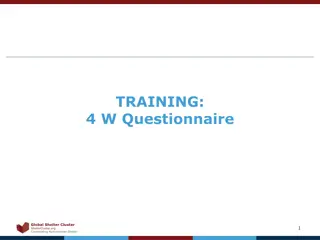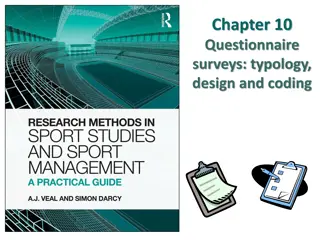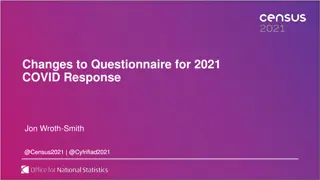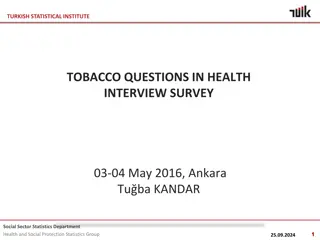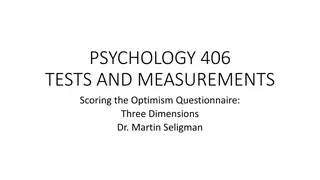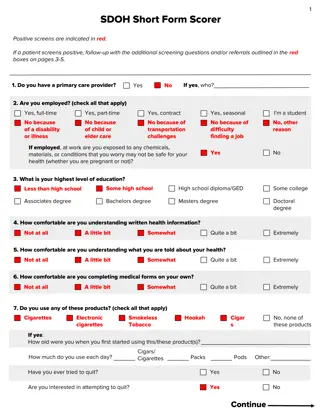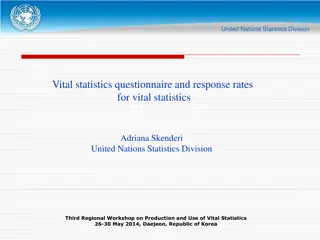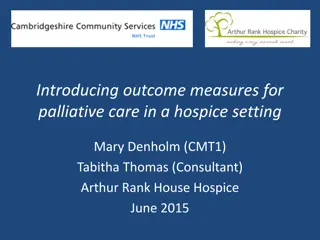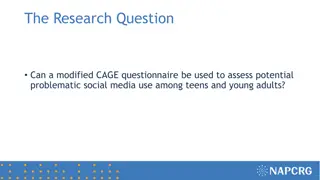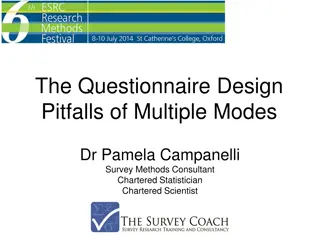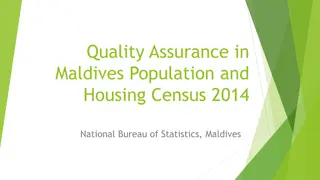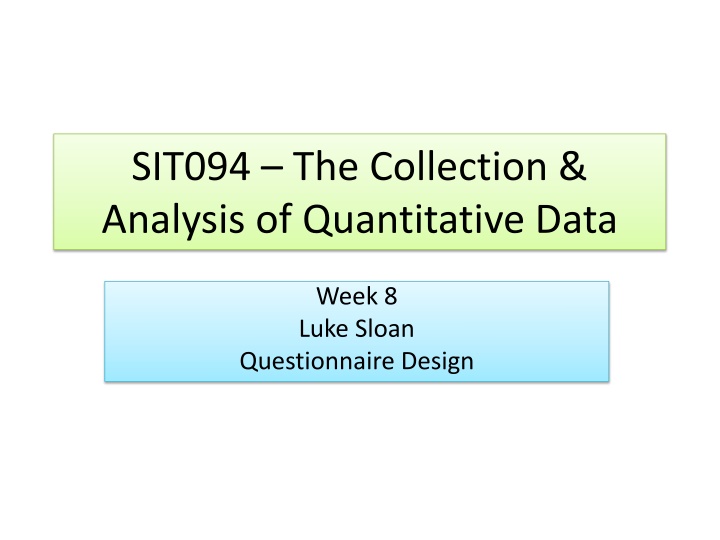
Validity and Reliability in Questionnaire Design for Social Concepts
Discover the importance of validity and reliability in questionnaire design for social concepts. Learn about different types of validity, including criterion, content, and construct validity, as well as the significance of reliability. Explore practical examples and considerations for measuring social constructs effectively.
Download Presentation

Please find below an Image/Link to download the presentation.
The content on the website is provided AS IS for your information and personal use only. It may not be sold, licensed, or shared on other websites without obtaining consent from the author. If you encounter any issues during the download, it is possible that the publisher has removed the file from their server.
You are allowed to download the files provided on this website for personal or commercial use, subject to the condition that they are used lawfully. All files are the property of their respective owners.
The content on the website is provided AS IS for your information and personal use only. It may not be sold, licensed, or shared on other websites without obtaining consent from the author.
E N D
Presentation Transcript
SIT094 The Collection & Analysis of Quantitative Data Week 8 Luke Sloan Questionnaire Design
Introduction Measuring Social Concepts Validity Reliability From Hypotheses to Questions Quantitative Data & Surveys Designing Questionnaires Workshop
Measuring Social Concepts First you need to define them e.g. is marriage breakdown A legal decision (divorce)? Living apart? Having an affair? How will you operationalise this? What questions will you use to tap into the concept? What will the responses be? For example, social class is extremely difficult to operationalise if measured properly it requires a 30 min interview Because data in the social world is fuzzy you may develop proxies for difficult concepts e.g. social class as occupation, poverty using postcode (IMD), racism as a response to statements Note that social class, poverty and racism are all social constructs and are not directly measurable - this can lead to measurement error
Validity CRITERION VALIDITY involves comparing the way people rate on [a] new measure with how they rate on well-established measures of the concept. (de Vaus 2011) For example using existing racism metric as a benchmark and comparing with your new metric Assumes that benchmark is initially correct and many social concepts are not yet established CONTENT VALIDITY evaluates how well the measures tap the different aspects of the concept as we have defined it. (de Vaus 2011) For example using an IQ test to establish intelligence (a very particular type!) In social science there is rarely consensus on nature of content what makes a racist? CONSTRUCT VALIDITY relies on seeing how well the results we obtain when using the measure fit with theoretical expectations. (de Vaus 2011) For example predicting that as age increases so does racism what if your results do not support your hypothesis? If your theory or your measurement wrong? No way to prove which one is incorrect and only assessable during the analysis (too late to redo)
Reliability A reliable measure is one that gives the same reading when used on repeated occasions. (de Vaus 2011) For example, a speedometer that measured a car travelling at 55mph and then at 72mph would be useless if the car had not actually changed speed Sources of unreliability can be: Poor question wording Different formats of data collection instruments Ordering of questions Lack of knowledge/opinion Difficult questions (how much do you earn a week?) What if I asked you how healthy your were in January and then again in July?
From Hypotheses to Questions We use data collection questions to collect the data with which we can test our hypotheses They form part of the data collection instrument (interview schedule, survey etc ) For example, to test the hypothesis that males do worse than females at GCSE English Are you male or female? What was your final result for GCSE English? If you re distinguishing between exams and coursework you might also ask What was your final coursework mark for GCSE English? What was your final exam mark for GCSE English? You must make sure that your data collection questions answer your hypotheses!
Quantitative Data & Surveys Surveys are the mainstay of quantitative data collection, but any data collection instrument can collect numeric data However surveys are potentially cheap, quick, convenient (for researcher and respondent) and reduces interviewer bias They also allow us to gather the opinions of many people relatively easily our samples need to be representative of the population However you cannot prompt or probe and irrelevant questions cause fatigue Issues of literacy, language, response rates Importantly, all questions can be read in advance (e.g. fast driving)
Designing Questionnaires I MEDIUM TYPE STYLE Face-to-face Telephone Email Web 2.0 Paper Electronic Set responses Open text Anonymous? Logic routing? Audio responses? Remember to use different types of questions to gather data Closed questions Open-ended questions Multiple choice Likert scales Scenarios Heat maps Personal factual questions Factual questions about others (informant) Questions about attitudes Questions about beliefs Questions about normative standards & values Questions about knowledge (testing)
Designing Questionnaires II Due to the removal of the researcher at the data collection phase there are certain issues that you must keep in mind Avoid general (unspecific) questions How satisfied are you with your job? Avoid double-barrelled questions How satisfied are you with your job and pay? Avoid negatives (and double negatives!) Do you not agree with not reviewing your pay? Don t make people answer irrelevent questions How much do you earn? to someone who is unemployed (routing!)
Designing Questionnaires III Cover page explaining study and data usage official not personal Formatting and appearance is important Page should not look busy Survey should not be too long Use matrixes to compress questions Scrolling for online surveys or more pages? Why would anyone want to fill it in? Clarify response expectations (tick one/all that apply) How will logic routing work remotely? You should have a look at some of the national surveys online to get an idea
Designing Questionnaires IV The key to a successful questionnaire is good coding! Give a case number for each questionnaire (ID) Give a number for each response option (except open text fields) Use actual numbers (responses) for numeric data Try to standardise/categorise answers for open ended questions (create codes for each category) May help to type codes next to response on questionnaire Think about missing data e.g. -99 = missing , -88 = not applicable ?
Always pilot your interview questions and your questionnaires
How reliable and valid do you think the following questions are?
Question 1 How well can you speak English? Very well Well Not well Not at all Does this measure the correct concept?
Question 2 Which of these qualifications do you have? 1-4 O levels/CSEs/GCSEs (any grades), Entry Level, Foundation Diploma NVQ Level 1, Foundation GNVQ, Basic Skills 5+ O levels (passes)/CSEs (grade 1)/GCSEs (grades A*-C), School Certificate, 1 A level/2-3 AS levels/VCEs, Higher Diploma NVQ Level 2, Intermediate GNVQ, City and Guilds Craft, BTEC First/General Diploma, RSA Diploma Apprenticeship 2+ A levels/VCEs, 4+ AS levels, Higher School Certificate, Progression/Advanced Diploma NVQ Level 3, Advanced GNVQ, City and Guilds Advanced Craft, ONC, OND, BTEC National, RSA Advanced Diploma Degree (for example BA, BSc), Higher Degree (for example MA, PhD, PGCE) NVQ Level 4-5, HNC, HND, RSA Higher Diploma, BTEC Higher Level Professional qualifications (for example teaching, nursing, accountancy) Other vocational/work-related qualifications Foreign qualifications No qualifications
Question 2 A Commentary Firstly does anyone know how to answer? Very strange ordering and distinctions Overlapping categories (e.g. PGCE and professional qualification teaching in different groups? Scottish Highers? Students who moved to England? Surely not a foreign qualification! What about the International Baccalaureate? Certainly not foreign Distinguishes between 1 and 2 A levels (or 2-3 and 4+ AS levels) but not a BSc/Ba and postgraduate qualification Last point is odd considering the growing number of university graduates and the increased demand for postgraduate training
Question 3 Think about your weekly grocery shop. What proportion of your expenditure is spent on the following items in a typical week? (e.g. 15% spent on fruit) Fruit Vegetables Meat Confectionary Alcohol Entertainment Clothes Such ratio questions are common in market research Very difficult to answer (issues for reliability) Proportion of expenditure requires complex thought processes
Workshop Go to the Survey Question Bank online (surveynet.ac.uk/sqb/) Select Topics from the menu on the left Browse a topic that your are interested in Try to find questions that you think may be unreliable or lack validity!






